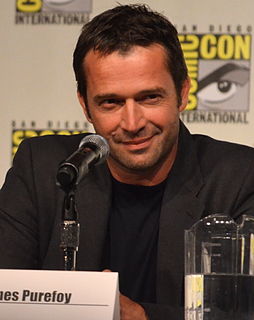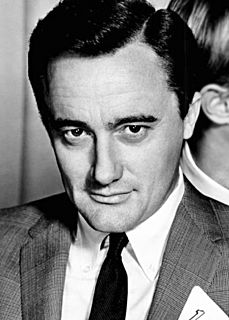A Quote by Neil Postman
Television is our culture's principal mode of knowing about itself. Therefore -- and this is the critical point -- how television stages the world becomes the model for how the world is properly to be staged. It is not merely that on the television screen entertainment is the metaphor for all discourse. It is that off the screen the same metaphor prevails. (92)
Related Quotes
Creativity is more about taking the facts, fictions, and feelings we store away and finding new ways to connect them. What we're talking about here is metaphor. Metaphor is the lifeblood of all art, if it is not art itself. Metaphor is our vocabulary for connecting what we are experiencing now with what we have experienced before. It's not only how we express what we remember , it's how we interpret it - for ourselves and others.
Television is the same as the telephone, and the same as the World Wide Web for that matter. People who become obsessed by the peculiarities of these communications media have simply failed to adjust to the shock of the old. People who bleat on about the 'artistic' potential of television qua television are equally deluded.
Without metaphor the handling of general concepts such as culture and civilization becomes impossible, and that of disease and disorder is the obvious one for the case in point. Is not crisis itself a concept we owe to Hippocrates? In the social and cultural domain no metaphor is more apt than the pathological one.
The days of television as we knew it growing up are over. You have a bigger, wider world audience on the Internet, larger than any American television series. People don't watch television in the same context as before. Nowadays they watch their television on the Internet at their convenience. That's the whole wave, and it's now - not the future.
The line-by-line, sequential, continuous form of the printed page slowly began to lose its resonance as a metaphor of how knowledge was to be acquired and how the world was to be understood. "Knowing" the facts took on a new meaning, for it did not imply that one understood implications, background, or connections. Telegraphic discourse permitted no time for historical perspectives and gave no priority to the qualitative. To the telegraph, intelligence meant knowing of lots of things, not knowing about them.
I'll tell you what I really think about politicians. The other night I watched some politicians on television talking about Vietnam. I wanted very much to burst through the screen with a flame thrower and burn their eyes out and their balls off and then inquire from them how they would assess the action from a political point of view.
I believe that one of the most damning things about our culture is the adage to never talk religion and politics. Because we don't model this discourse at the dinner table and at Thanksgiving, we don't know how to do it well and we're not teaching our children about the world and about how to discuss it.

































